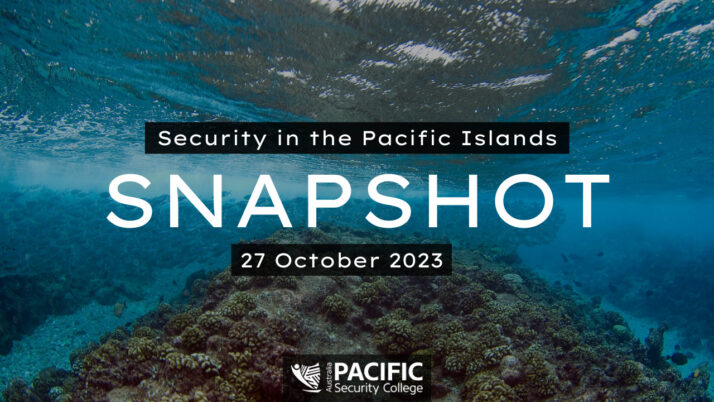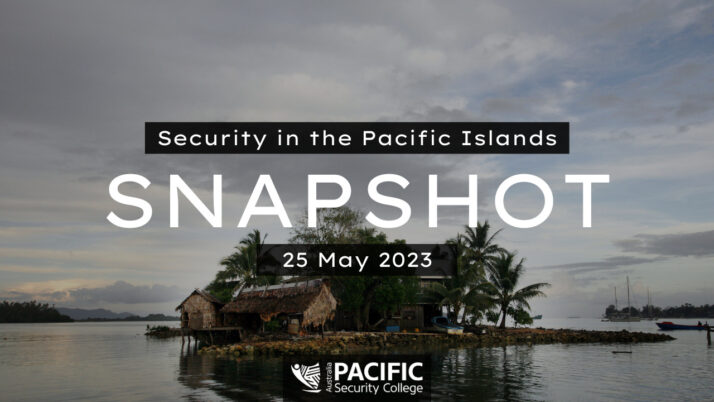Partners in the Pacific

AUSMAT nurse Marlene Bell supporting staff and new mothers in the maternity wards in Suva, as part of Australia’s COVID-19 response. [DFAT]
As head of Australia’s Office of the Pacific, Ewen McDonald reflects on how Australia continues to support the Pacific in challenging times.
2021 was another tough year for the Pacific. The health impacts of COVID-19 hit hard, especially in Papua New Guinea and Fiji. The economic effects really started to bite. It was also a year of resilience and success – great and small – against the odds. I’m optimistic 2022 will be a year of economic recovery for the Pacific and of renewed in-person connections with our Pacific family.
For Australia, there was a recurring theme, one that goes to the heart of our Pacific Step-up. As Prime Minister Morrison put it in March, ‘They’re our family. They’re our friends. They’re our neighbours. They’re our partners. They have always stood with us and we will always stand with them.’ He was announcing our response to the COVID-19 crisis in Papua New Guinea, but it defined all of our work in 2021. Our fortunes are tied to those of our Pacific family and we’re committed to supporting our region respond to its major challenges.
When community transmission of COVID-19 escalated in Papua New Guinea, Fiji and Timor-Leste, Australian Medical Assistance teams (AUSMAT) deployed quickly, in response to requests, providing critical expertise and support – with six teams deploying to Papua New Guinea, three to Fiji and two to Timor-Leste. Our support in Papua New Guinea continues, including for local initiatives aimed at countering vaccine hesitancy and misinformation.
Australia is supporting Pacific-led safe and effective vaccine rollouts. We have been the main provider of vaccines to the Pacific, so far donating more than 2.4 million doses to the Pacific and Timor-Leste with quantities and speed in line with countries’ capacity to get vaccines into arms. Australia’s commitment to provide up to 15 million doses to the Pacific and Timor-Leste goes beyond vaccines – and includes assistance for medical equipment, testing and surveillance, health worker training, cold chain storage, national immunisation policies and public messaging campaigns. As many Pacific island countries reach comprehensive vaccination coverage, we are supporting countries to reopen.
Vaccines and humanitarian assistance have been delivered on flights underwritten by Australia’s Pacific Flights Program, via the PIF’s Humanitarian Pathway. Our work with Pacific partners on certification will be critical for Pacific countries to open their borders safely and to kick start the region’s economic recovery. We’re celebrating alongside Fiji the resumption of international flights to Fiji and the restart of tourism.
The economic impact the pandemic in the Pacific is profound and will reverberate for years. Recognising the challenges ahead, in addition to maintaining a record $1.44 billion in development assistance to the Pacific in 2021-22, we are delivering temporary and targeted support through our COVID-19 Response Package (totalling $304.7 million for 2020/21 and 21/22). This has enabled Fiji to bolster spending on its social protection schemes, provided budget support to Papua New Guinea and supported cash transfers to vulnerable families in Vanuatu.
The flow of Pacific workers in Australia and remittances back to Pacific communities through labour mobility is vital. Despite the challenges of border closures and quarantine arrangements, there are over 19,000 labour mobility workers from the Pacific and Timor-Leste in Australia, filling critical workforce shortages. By March 2022, the aim is to have 25,000 workers in Australia. From April, the Pacific Australia Labour Mobility (PALM) scheme will streamline and strengthen our approach, building on our previous labour mobility programs.
The sight of Fiji’s Rugby 7s men’s team claiming gold at the Tokyo Olympics, and the women’s side winning bronze, was a highlight of 2021. Australia recognises the hard work of the athletes and their trainers, and was proud to support the training and qualification of 82 Pacific athletes who competed in Tokyo, overcoming the challenges imposed by COVID-19 – even if it meant they beat Australia’s Rugby 7s teams in the process.
2021 was a year of delivery for the Australian Infrastructure Financing Facility for the Pacific (AIFFP) which is investing in high-priority, transformational and quality infrastructure in our region. We announced the Palau Submarine Cable, the East Micronesia Cable Project, an investment in Airports Fiji, financing for the Tina River Transmission System in the Solomon Islands and an MOU to develop a proposal to support PNG maritime port infrastructure. A strong pipeline of investments, totalling almost $2 billion, will stimulate economic activity and create local jobs to support the region’s economic recovery.
Climate change remains a critical challenge for the region, and Australia is committed to working with the Pacific to address climate change and its impacts. We have committed to net zero emissions by 2050 and are on track to reduce emissions by up to 35 per cent by 2030. At COP26 in Glasgow, Australia supported our Pacific partners’ attendance and announced an increase to our climate finance for the Pacific to $700 million. The Normative Declaration on Sea-Level Rise and Maritime Zones, agreed by Pacific Island Forum Leaders in August, was presented at COP26, taking it to the international stage. It sets a ground-breaking path for the preservation of the region’s maritime zones in the face of sea-level rise.
The end of the year presented more challenges for the region, especially our Solomon Island friends. Australia’s end-of-year response within 24-hours to a request from the Solomon Islands Government to restore peace to the streets of Honiara was another example of Australia’s and the region’s quick and decisive action to stand together. Over 100 Defence personnel, 60 AFP officers, and ten DFAT officers deployed to help calm ongoing protests and enable tensions to be resolved locally. Deployments from Papua New Guinea, Fiji and New Zealand to join the intervention, were a clear demonstration of our shared commitment and interest in regional security and stability.
It was great to accompany Foreign Minister Payne on her visit to Palau in December, and to see a gradual return to travel in our region. In November, New Zealand Foreign Minister Mahuta visited Australia, and Minister for International Development and the Pacific Seselja visited Fiji, ahead of the resumption of international flights from Australia. Let’s hope for more personal interactions and stronger security across the Blue Pacific in 2022.
In 2021 Australia delivered another five Guardian-class patrol boats to our Pacific partners, with 13 of the 21 promised patrol boats further enhancing maritime security in the region. The Pacific Fusion Centre is now operating from Port Vila, with Pacific analysts to start secondments in early 2022. We are pleased that the Pacific Security College, host of this blog, is providing Pacific policy makers with technical assistance and training across a spectrum of regional security priorities.
It’s an important and fast-paced agenda, building a region that is resilient, stable, prosperous and secure, in all of our interests.
More Stories

Security Snapshot - 27 Oct 2023
Pacific Security Snapshot | 27 October 2023
The security stories shaping the region Fiji Prime Minister Rabuka promotes Pacific “Zone of Peace” Fiji-Australia Memorandum of Understanding on Cyber Security Cooperation Papua New Guinea and China hold bilateral talks United States and Marshall Islands renew COFA Vanuatu, Samoa and Fiji receive Japanese human security support Pacific Islands Forum releases Loss and Damage Policy…

Security Snapshot - 26 May 2023
Pacific Security Snapshot | 25 May 2023
The security stories shaping the region ➣ Papua New Guinea and the United States sign Defence Cooperation Agreement ➣ United States-Pacific Islands Forum Dialogue held in Port Moresby ➣ Pacific leaders meet Indian Prime Minister Narendra Modi ➣ Pacific call for climate finance breakthrough at UN session ➣ Tuvalu strengthens efforts against illegal, unreported and…






